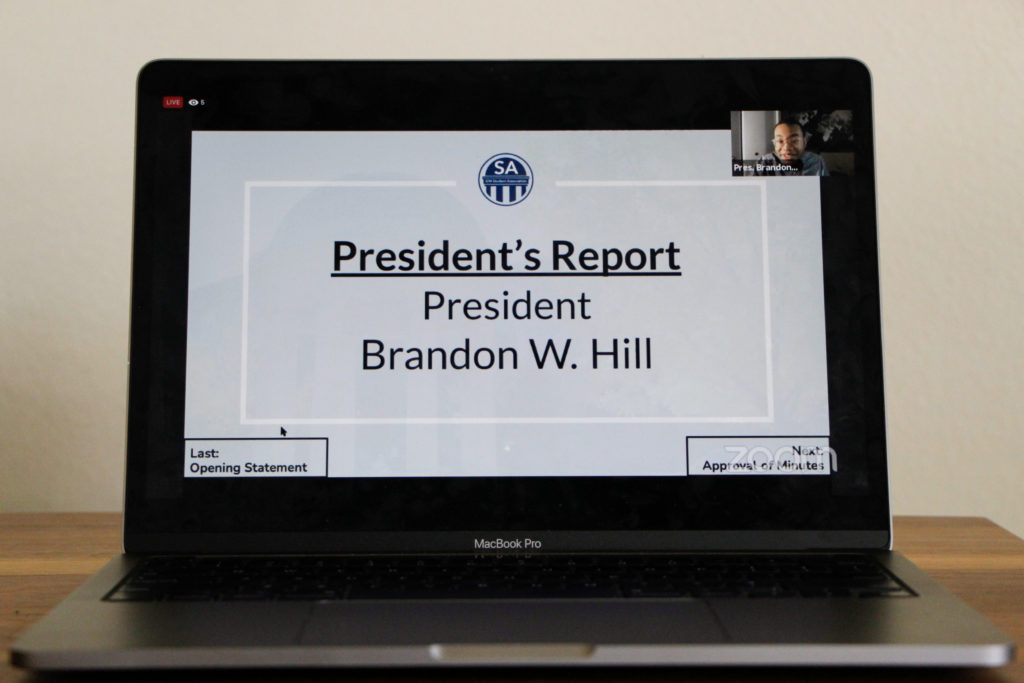The Student Association Senate approved the creation of three executive task forces to the body to govern topics like pandemic relief and interfaith justice at a meeting Monday.
Senators unanimously voted to create the Pandemic Recovery, Anti Racism and Interfaith Justice task forces, officially adding the groups to the executive branch after SA President Brandon Hill made three executive orders Saturday creating them. Senators also confirmed eight nominees to serve on the senate staff and in the executive cabinet and approved legislation to increase the requisite number of senators needed to hold a roll call vote.
Hill said the executive task forces put in place will be “essential” operations of the executive branch for the remainder of the semester.
Drew Amstutz, the director of pandemic recovery, will serve as the chair of the COVID-19 relief task force, with a total of six senators in the group.
“There is no doubt that the COVID-19 pandemic has drastically impacted the student experience,” Hill said in an executive order Saturday. “As we navigate into a post-COVID world, it is deemed necessary and proper to the Student Association’s functioning to begin planning and evaluating the University’s policies relating to the COVID-19 pandemic.”
Tonya Barnett, the director of racial and ethnic justice, will serve as the chair of the anti-racism task force along with four senators.
“The Anti Racism Task Force is deemed as a necessary and proper action for the Student Association to recognize the role we play, or lack thereof, in perpetuating racism and promoting anti-racist teachings,” Hill said in a separate order Saturday.
Julia Kerrigan, the director of interfaith engagement, will chair the interfaith justice task force, serving with more than a dozen other members.
“The Interfaith Justice Task Force shall serve as the primary interfaith advocacy body within the Student Association as it aims to include the interfaith community in our advocacy, fight all forms of faith-based hate on campus and promote student and faculty-based education models on interfaith issues,” Hill said in a third order Saturday.
Senators also overwhelmingly voted to approve a bill to increase the votes required for holding a roll call vote on legislation from one-fifth to one-third of the body and require voting for any nomination for executive vice president to be conducted via secret ballot. SA Sen. Philippa Balshaw, G-at-Large and a co-sponsor of the Roll Call Voting Act, said the purpose of increasing the voting requirement is to avoid “concern of favoritism of friendships” and senators worrying about how consistencies may view their votes.
The legislation follows some controversy from a meeting earlier this month when eight senators – just enough to meet the previous one-fifth requirement – forced a roll call vote on Hill’s nomination of SA Sen. Kate Carpenter, U-at-Large, as executive vice president. Carpenter’s nomination ended up being rejected in that vote.
“Our main concern was just the fact to quote consensus from last time the roll call vote was used as a bullying tactic – that’s a direct quote,” Balshaw said. “And that is something that we are trying to avoid here so we are not asking to restrict it in its entirety.”
SA Senators unanimously approved SA Sen. Jack Bloom, U-at-Large, as senate chief of staff, replacing Zackary Nosanchuck, who is now serving as the president’s chief of staff. The senate also confirmed freshman Melanie Campbell as senate secretary.
Senators also unanimously approved six nominations to the executive cabinet, including Anna Weber as vice president for campus operations; Hannah Clayton as vice president for undergraduate student policy; and Liz Gonzalez as vice president for academic affairs.
Weber and Gonzalez previously resigned from their vice president roles in the lead-up to the controversy that led to former SA President Howard Brookins’ resignation late last month. Clayton also had departed from her role as director of the arts before Brookins resigned.








